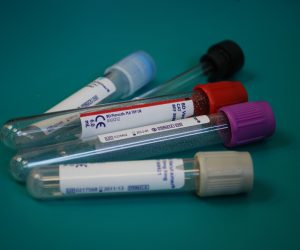
People Who Feel Dizzy When They Stand Up May Have Higher Risk of Dementia
American Academy of Neurology (AAN) via Newswise – Some people who feel dizzy or lightheaded when they stand up may have an increased risk of developing dementia years later, according to a new study published in Neurology®, the medical journal of the American Academy of Neurology. The condition, called orthostatic hypotension, occurs when people experience a sudden drop in blood pressure when they stand up.
The study found the link with dementia only in people who have a drop in their systolic blood pressure, not in people with only a drop in their diastolic blood pressure or their blood pressure overall. Systolic is the first, or top, number in a blood pressure reading and systolic orthostatic hypotension was defined as a drop of at least 15 mmHg after standing from a sitting position.
“People’s blood pressure when they move from sitting to standing should be monitored,” said study author Laure Rouch, Pharm.D., Ph.D., of the University of California, San Francisco. “It’s possible that controlling these blood pressure drops could be a promising way to help preserve people’s thinking and memory skills as they age.”
The study involved 2,131 people who were an average age of 73 and did not have dementia when they enrolled. Their blood pressure readings were taken at the start of the study and then one, three and five years later. A total of 15% had orthostatic hypotension, 9% had systolic orthostatic hypotension and 6% had diastolic orthostatic hypotension.
Over the next 12 years, the participants were evaluated to see if anyone developed dementia. A total of 462 people, or 22%, did develop the disease.
The people with systolic orthostatic hypotension were nearly 40% more likely to develop dementia than those who did not have the condition. Fifty of the 192 with systolic orthostatic hypotension, or 26%, developed dementia, compared to 412 of the 1,939 people without it, or 21%. When researchers adjusted for other factors that could affect dementia risk, such as diabetes, smoking and alcohol use, those with systolic orthostatic hypotension were 37% more likely to develop dementia.
The researchers also found that people whose sitting-to-standing systolic blood pressure readings changed the most from visit to visit were more likely to develop dementia years later than people whose readings were more stable.
The people were divided into three groups based on how much their readings changed over time. A total of 24% of people in the group with the most fluctuation in systolic readings later developed dementia, compared to 19% of the people in the group with the least fluctuation. When researchers adjusted for other factors affecting dementia risk, those in the highest group were 35% more likely to develop dementia than those in the lowest group.
Rouch noted that the study is observational and does not show cause and effect. It only shows an association between the blood pressure readings and the development of dementia. Another limitation of the study was that the diagnosis of dementia was made without distinction between Alzheimer’s disease and vascular dementia.
The study was funded by the National Institute on Aging.
This article has been modified. To read the original article click here.






